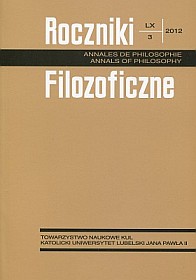Rev. Prof. Marian Kurdziałek – Promoter of the Notion of Boethian Neoplatonism
Abstract
The eminent German medievalist, Joseph Koch, assumed that Neoplatonism had been handed down to the Middle Ages basically in two forms: the one given to the Neoplatonist outlook by St. Augustine, the other being the result of the reworking of Neoplatonist themes by Pseudo-‑Dionysius. Rev. Prof. Kurdziałek, when quoting Koch’s opinion, used to remark, that this bipartite typology was not adequate as it failed to take account of another variety of Neoplatonism that had been operative in the shaping of medieval intellectual culture, namely the Boethian Neoplatonism.
Few scholars in Poland in the second half of the 20th century devoted much attention to Boethius’ philosophy; yet contrary to the general trend, Rev. Prof. Kurdziałek constantly discussed issues and themes concerning Boethius in his lectures, monographs and articles. The author of the Consolation of Philosophy was never viewed by him as a mere intermediary or transmitter standing between antiquity and the Middle Ages; rather he presented Boethius as a thinker that was seminal in shaping medieval philosophy up to and inclusive the 12th century and even later on, even though his later influence had not been predominant. This article, based upon the study and analysis of Rev. Prof. Kurdziałek’s output aims to present his contribution to the area of Boethian studies as well as contributions made in this field by his disciples and followers.
References
Boecjusz: Komentarz do „Hermeneutyki” Arystotelesa (Commentarius in librum Aristotelis PERI ERMENEIAS, editio secunda), przeł. T. Tiuryn, Kęty 2010.
Boecjusz: Traktaty teologiczne, tłum. A. Kijewska, R. Bielak, Kęty 2001.
Chenu M.-D.: La théologie au douzième siècle, Paris 1966.
Courcelle P.: Boèce et l’école d’Alexandrie, „Mélanges des l’Ecole fançaise de Rome” 52 (1935), s. 185-223.
Courcelle P.: Les Lettres grecques en Occident, Paris 1948.
Gilson E.: Duch filozofii średniowiecznej, tł. J. Rybałt, Warszawa 1958.
Gilson E.: Maimonide et la philosophie de l’Exode, „Mediaeval Studies” 13 (1951), s. 223-225.
Judycka J.: Marian Kurdziałek i jego krytyczna edycja pism Dawida z Dinant, „Acta Mediaevalia” 20 (2007), s. 37-54.
Kijewska A.: Filozof i jego muzy. Antropologia Boecjusza – jej źródła i recepcja, Kęty 2011.
Kijewska A.: Mathematics as a Preparation for Theology: Boethius, Eriugena, Thierry of Chartres, [w:] Boèce ou la chaîne des saviors, wyd. A. Galonnier, Louvain-Paris 2003, s. 625-647.
Koch J.: Augustinischer und Dionysischer Neuplatonismus und das Mittelalter, [w:] Platonismus in der Philosophie des Mittelalters, wyd. W. Beierwaltes, Darmstadt 1969, s. 317-342.
Kurdziałek M.: Aleksander Birkenmajer ‘historyk filozofii średniowiecznej’, [w:] Średniowiecze w poszukiwaniu równowagi między arystotelizmem a platonizmem, Lublin 1996, s. 7-16.
Kurdziałek M.: David von Dinant als Ausleger der aristotelischen Naturphilosophie, [w:] Die Auseinandersetzungen an der Pariser Universitat, Miscellanea Mediaevalia 10, Berlin–New York 1976, s. 181-192.
Kurdziałek M.: Dawid z Dinant i jego próba uzgodnienia dwunastowiecznej filozofii przyrody z filozofią Arystotelesa, [w:] Średniowiecze w poszukiwaniu równowagi między arystotelizmem a platonizmem, Lublin 1996, s. 211-232.
Kurdziałek M.: Der Mensch als Abbild des Kosmos, [w:] Der Begriff der Representatio im Mittelalter, wyd. A. Zimmermann, Miscellanea Mediaevalia 8, Berlin–New York 1971, 35-75.
Kurdziałek M.: Dlaczego św. Tomasz z Akwinu komentował De Trinitate i De hebdomadibus Boecjusza?, [w:] Średniowiecze w poszukiwaniu równowagi między arystotelizmem a platonizmem, Lublin 1996, s. 169-182.
Kurdziałek M.: Gilbertus Anglicus und die psychologischen Eroerterungen in seinem „Compendium Medicinae”, „Sudhoffs Archiv für Geschichte der Medizin und der Naturwissenschaften” 47 (1963), s. 106-126.
Kurdziałek M.: L’idée de l’homme chez David de Dinant, [w:] Images of Man in Ancient and Medieval Thought. Studia Gerardo Verbecke, Leuven 1976, s. 311-322.
Kurdziałek M.: Mistrz Eckhart i jego Paryskie kazanie na dzień św. Augustyna, [w:] Średniowiecze w poszukiwaniu równowagi między arystotelizmem a platonizmem, Lublin 1996, s. 311-324.
Kurdziałek M.: O tak zwanej metafizyce Księgi Wyjścia, [w:] Średniowiecze w poszukiwaniu równowagi między arystotelizmem a platonizmem, Lublin 1996, s. 99-118.
Kurdziałek M.: Średniowieczne stanowiska wobec tezy: Ziemia jest jedną z planet, [w:] Średniowiecze w poszukiwaniu równowagi między arystotelizmem a platonizmem, Lublin 1996, s. 233-270.
Kurdziałek M.: Theologiae philosophantes, [w:] Średniowiecze w poszukiwaniu równowagi między arystotelizmem a platonizmem, Lublin 1996, s. 131-145.
Kurdziałek M.: Zachęta Boecjusza do jednania poglądów Arystotelesa i Platona oraz boecjańskie i Augustyńskie wezwanie do łączenia wiary z rozumem, [w:] Średniowiecze w poszukiwaniu równowagi między arystotelizmem a platonizmem, Lublin 1996, s. 47-59.
O’Meara D.J.: Platonopolis. Platonic Political Philosophy in Late Antiquity, Oxford 2003.
Picavé M.: Zur Verwendung der Schriften des Aristoteles in den Fragmenten der Quaternuli des David von Dinant, „Freiburger Zeitschrift fur Philosophie und Theologie” 45 (1998), s. 381-406.
Satorowicz J.: Boecjusz w Atenach. Zamrożony błąd historyczny, „Kwartalnik Filozoficzny” 27/3 (1999), s. 55-65.
Swieżawski S.: Boecjusz – ostatni Rzymianin, Lwów 1935.
Swieżawski S.: Dzieje europejskiej filozofii klasycznej, Warszawa–Wrocław 2000.
The Cambridge Companion to Boethius, wyd. J. Marenbon, Cambridge 2009.
Wielgus S.: Ks. profesor Marian Kurdziałek (1920-1997) wydawca średniowiecznych źródeł, współtwórca mediewistycznej szkoły edytorskiej w Katolickim Uniwersytecie Lubelskim, „Acta Mediaevalia” 13 (2000), s. 7-27.
Zieliński E.I.: Współtwórca polskiej mediewistyki, „Roczniki Filozoficzne” 37-38 (1989-1990), s. 5-26.
Copyright (c) 2012 Roczniki Filozoficzne

This work is licensed under a Creative Commons Attribution-NonCommercial-NoDerivatives 4.0 International License.





